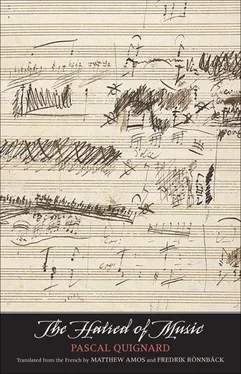Pavor diurnus . In the sanctuary. In a corridor on Rue Sébastien-Bottin 5for twenty-five years: no one there and still we speak softly. Monklike whispering. Occasional meowing laughter. We are wicker puppets, what the Romans called larva , and the older, ancestral dead pull the strings.

The living reside more often than they know with the before-living or in the world of the dead.
This was the knowledge of shamans, and this presumption was the foundation of their skill in healing the body: the mania of an ancestor lies in wait for you. A word was pronounced seven generations before your birth.

Something said in confidence, in a forest, thirty-two years ago.
We were alone among the yellowing leaves and wavering rays of light: she lowered her voice to a faint whisper, deafening my perception, confiding to me her every desire.
I could not understand what she said. I was wrong half the time. Who was she afraid might overhear? A deer? A leaf?
God?
Her lips brushed against my ear.

Pavor that will not be remitted. Pavor connatural with children playing marbles. They have one knee on the ground. They aim at a marble while on the lookout for something else.

Permanent lookout for irruption, for arrhythmia, for war, for uprising under the threat of death. Passivity before the intrusion from which nothing protects us. When has night ever been less deep than in the state that precedes birth, which is the third intrusion of life? What man has escaped the death lying in wait for him, ready to pounce, preparing the death rattle?
In what place does the ground cease to open up suddenly beneath our feet?

Reading in the garden in the heat, the languor, the slowness, the drowsiness that come together in summer.
A lizardling’s foot, as it moves a dead leaf, produces a crash that makes the heart jump.
You are already on your feet, trembling all over, in the burning grass.

In nature, human languages are the only sounds that are pretentious. (They are the only sounds, in nature, that pretend to give a meaning to this world. They are the only sounds that have the arrogance to pretend to provide those who produce them a meaning in return. A hammering of feet that makes the earth resound: expavescentia, expavantatio , which is the sound of humans who ceaselessly trample the earth, fleeing, terrified, nearness to place. 6Nearness to place, before the Neolithic, was the abyss.)

The beginning of Fronto’s Principia Historiae:
Vagi palantes nullo itineris destinato fine non ad locum sed ad vesperum contenditur. (Wandering, scattered, their journeys have no goal, they walk, not toward a place, but toward the evening.)
Non ad locum:
not toward a place.
Man’s den is his Occident. The world of the dead, there lies his dwelling, where the sun leads him each day as it dies before him.

There is a fragment by Pacuvius that formulates what interrupts the plurimillennial hammering march. In 1823, J. B. Levée translated it thus: “Ce promontoire dont la pointe s’avance dans la mer.” 7
Promontorium cujus lingua in altum projicit.
A lingua 8 is that with which a society juts out into nature. Language, strictly speaking, does not extend what is. It exteriorizes. It introduces outside into plenitude. Introducing delay into the immediate: this is music (or memory) and that is why mnèmosynè and musica are the same. Logos insinuates two into one. Anno Domini 520, the Greek philosopher Damascius, in Athens — before he was expelled from the empire and pushed toward Persia by the Christian edicts — wrote that all logos was the foundation of a kingdom of dissidence in a continuous universe.

Lingua grows the “outside,” the “afterward,” absence, discontinuity, death, binary division, couple, interval, duel, sex, struggle.
Just as negation in the eyes of the linguist does not subtract anything: it adds to the positive sentence the marks that negate it.

At the beginning of language, all languages acquired sounds whose purpose was to subtract —whose purpose was to excise what was just said, and that must be put forward in order to subtract it.
Thus lingua is a Tarpeian Rock and the flow of words the mass of a crowd pushing a man who falls into the vertical void that separates him from the sea. In the language of the Ancient Greeks the word problema signifies this very escarpment rising above the waves below, on top of which the city sacrifices by pushing a victim over the edge. It is curious — it is almost Fescennine — that promontory, language, problem, death are the same.

Promonotorium, lingua, problema .

“Sounds whose purpose is to subtract” define music.
The sounds of music subtract from human language in the same way that they separate from the natural Acoustic.
Sounds of death.
Hermes empties the tortoise, steals a cow and cooks it, cleans the skin, stretches it over the shell emptied of its flesh, then finally attaches it and strings across it seven sheep entrails. He invents the kithara . Then he gives his tortoise-cow-sheep to Apollo.
Syrdon, in the Book of Heroes , finds bodies of his children boiling in the cauldron, strings the veins from the twelve hearts of his dead sons over the bones of the right hand of his eldest. Thus Syrdon invents the first foendyr .

In the Iliad , the kithara is not a cithara: it is still a bow. And the musician is still Night, that is, nocturnal panic hearing. It is the opening, the first book, verse 43: “Apollo came down from the summits of Olympus. On his shoulder were the silver bow and his tightly closed quiver. Each step he took in his heart’s fury, the arrows resounded on his back. He strode, like the Night ( Nukti eoikōs ). Apollo positioned himself away from the ships. He shot an arrow. The silver bow emitted a terrifying bark ( deinè klaggè ). First he hit the mules, then the dogs that run so fast. Finally he pierced the warriors. The funeral pyres burned without end. For nine days the arrows of the God rained down on the army.”
At the other end of the work, at the end of the Odyssey , Ulysses solemnly enters the palace hall. He draws his bow. He prepares to shoot his first arrow, signaling the massacre of the suitors, another sacrifice once more assisted by Apollo the Archer. Book XXII: “Just as a man knowledgeable in the art of the lyre and of singing, having attached to the ends of his instrument a string made of flexible and acoustic entrails, easily tightens it by turning a peg and tunes it, Ulysses, all of a sudden, effortlessly arched his formidable bow. To test the string he opens his right hand. When released, the string sang beautifully ( kalon aeise ), with a voice ( audèn ) like a swallow.”
Читать дальше













